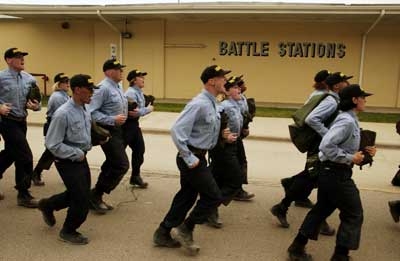Navy Bathroom Decor
Those who enlist in the Navy go through eight weeks (plus one week just for processing and paperwork) of boot camp at the Great Lakes Naval Training Center, on the shore of Lake Michigan near Chicago. Boot camp for the Navy is more classroom-based than other military training programs – even marching and weapons exercises are conducted indoors. In part, this is because so many regular Navy activities take place inside ships.

Photo courtesy of The U.S. Navy
A recruit division sings as they successfully complete the final leg of a Battle Stations drill.
Anyone wishing to become an officer in the Navy (and possibly captain a ship someday) has several options. The U.S. Naval Academy in Annapolis, Maryland is a four-year undergraduate college that prepares graduates to work as officers in the Navy. This is a prestigious and challenging program that requires a Congressional nomination to apply. Potential officers can also attend Officer Candidate School in Pensacola, Florida. This 13-week course is more rigorous than boot camp, and requires recruits to hold a degree before acceptance.

Photo courtesy of The U.S. Navy
Newly commissioned officers celebrate at the U.S. Naval Academy class of 2005 graduation and commissioning ceremony.
Once past their initial training, recruits may attend a technical school or take part in the Journeyman Program. This places each Navy recruit with more experienced sailors in a variety of ratings to learn various Navy tasks first hand.
Life on shore for Navy personnel is much the same as it is on other military bases. Everyone receives a housing stipend (new recruits usually live in dormitory-style apartments), and on-base housing is available for single sailors as well as larger families. Many amenities are included on the base, like grocery stores, medical facilities, churches and libraries. Recreational opportunities are provided as well, such as movie theaters, golf courses and fitness centers.
The focus of Navy life, of course, is living and working on a ship. The standard Navy ship deployment lasts for six months; however, the Navy is experimenting with deployments shorter or longer than six months to make them more flexible and less predictable. Needless to say, living for six months or more with several hundred people on a ship means close quarters and a lot of patience and camaraderie. The circumstances also require complete, unwavering loyalty and obedience to the ship's captain, whose authority on his or her ship is absolute.
There is a great deal of work to be done at any given time on a Navy ship, so sailors are kept busy. Even so, limited recreational activities are provided – one famous example was the "Reagan Idol" singing competition held on the USS Ronald Reagan that landed the winner on the actual American Idol TV show in 2007. In addition, every sailor gets 30 days of leave each year. They can fly for free on a stand-by basis on any Navy flight and most other military flights [source: The U.S. Navy].

Photo courtesy of The U.S. Navy
Intelligence Specialist 2nd Class Jarrod Fowler performs during the Ronald Reagan Idol talent competition, March 26, 2006.
Women play an important role in the modern Navy – their progress toward equal treatment and pay mirrored the equal rights movement in the United States. In 1976, Congress ordered that women be allowed to enter the Naval Academy. However, a 1948 law prevented women from serving on most Navy ships. This was overturned in 1978, and women have been serving their country aboard Navy vessels ever since. In addition, women were cleared for air combat duty in the 1990s, and now serve in that respect as well [source: PBS].

Photo courtesy of The U.S. Navy
Lt. Renee Scherr, assigned to Commander Helicopter Sea Combat Wing Pacific, speaks to a group of 5th grade girls during a career day at Meridian Elementary School.
As members of a U.S. military organization, all Navy personnel are subject to the Uniform Code of Military Justice. Dismissal from the Navy can take a variety of forms, from an honorable discharge to a court martial, depending on the circumstances surrounding the dismissal. See How the Army Works for a full explanation.
Navy veterans and retirees are eligible for a host of benefits ranging from burial in state cemeteries, health and life insurance, low-interest loans for mortgages or small businesses, and veterans' health care. The full suite of benefits available may depend on the nature of the veteran's dismissal – usually an honorable discharge or retirement is necessary for access to all benefits. A search for answers to specific questions about veterans' benefits begins here: The National Archives.
For lots more information on the Navy and related topics, check out the links on the following page.
Source: https://science.howstuffworks.com/navy.htm#pt2

0 komentar:
Posting Komentar